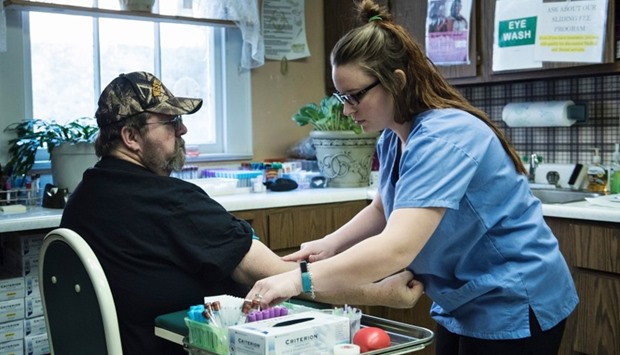US President Donald Trump was to make a final push on Thursday to get the support needed to begin dismantling Obamacare in the House of Representatives but faced signs that enough Republicans might oppose the bill to jeopardize one of his top legislative priorities.
The effort is seen by financial markets as a crucial test of Trump's ability to deliver on his legislative agenda, including planned tax cuts. Republican leaders hoped to vote on the healthcare bill on Thursday, the seventh anniversary of former Democratic President Barack Obama signing his healthcare law. There were indications the House vote could be pushed back.
Trump scheduled a White House meeting at 11:30 a.m. ET/1530 GMT with some of the healthcare bill's strongest opponents - members of the conservative House Freedom Caucus who say it does not go far enough to undo Obamacare.
‘We're still open for negotiations,’ Representative Ted Yoho, a member of the group, told CNN. ‘There is still time.’
Republicans have a majority in the House but Democratic Representative Steny Hoyer said they clearly did not have enough votes to pass the bill, which has been championed by House Speaker Paul Ryan. With Democrats united against the bill, Trump and Ryan can afford to lose only 21 Republican votes.
‘In my judgment right now there are probably about 30 or 40 no votes on the Republican side,’ Mo Brooks, a member of the House Freedom Caucus, said on MSNBC.
‘If we can make this legislation something other than just 'not as bad as Obamacare,' make it into something that's actually good for the American people, then I think we'd get a lot more support than you're seeing right now.’
A senior Republican in the House, Ways and Means Committee Chairman Kevin Brady, said Republicans were getting closer to a measure they could agree on.
‘I don't know the timing on this but I know we are getting very close,’ Brady said on Fox News. ‘I know we still have work to do to make sure members' concerns are heard.’
Trump urged Americans in a tweet early on Thursday to press their representatives to vote for the bill, known formally as the American Health Care Act.
Uncertainty over the bill has rattled financial markets and a failure just two months into Trump's presidency would be a setback for the White House, which as late as Wednesday said there was ‘no Plan B’ for the healthcare measure.
US stock markets have risen steadily in recent months on optimism over a pro-business Trump agenda but fell back sharply on Tuesday as investors worried that failure to push through the healthcare bill could have a knock-on effect on other Trump priorities such as tax cuts and infrastructure spending.
VOTE TIMING
The House vote had been expected by about 7 p.m. (2300 GMT). But by midnight on Wednesday, lawmakers had not yet settled on the timing as conservative and moderate Republicans split on whether there should be additional changes to the proposal.
House Rules Committee Chairman Pete Sessions said the vote could happen as early as Thursday or as late as Monday.
With Republicans in control of the White House, the Senate and the House, the party has a chance to achieve what it has aimed to do for seven years - overturn Obama's 2010 Affordable Care Act.
The law aimed to boost the number of Americans with health insurance through mandates on individuals and employers, and income-based subsidies. Some 20 million Americans gained insurance coverage through the law.
The replacement plan in the House would rescind the taxes created by Obamacare, repeal a penalty against people who do not buy coverage, slash funding for the Medicaid program for the poor and disabled, and modify tax subsidies that help individuals buy plans.
While conservative Republicans are pushing for more aggressive cuts to Obamacare mandates, some moderates in the party are worried that the legislation would hit some of their core voters by depriving them of insurance.
The nonpartisan Congressional Budget Office estimated 14 million people would lose medical coverage under the Republican plan by next year. It also said 24 million fewer people would be insured by 2026.
Representative Charlie Dent, a leader of the ‘Tuesday Group’ of House Republican moderates who has said he cannot support the bill, said he believed Republican leaders had not yet corralled enough support to pass the bill.
‘I never quite understood the mad rush,’ Dent told MSNBC. ‘The plan is to send this bill over to the Senate so the Senate can rewrite it and then tell us what's in it and send it back to us. It seems like we’re surrendering much of our legislating authority over to the Senate.’

